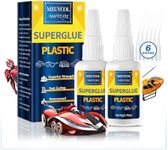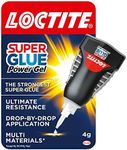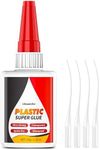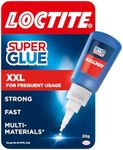Buying Guide for the Best Plastic Glues
Choosing the right plastic glue is essential for ensuring a strong and durable bond between plastic surfaces. The type of plastic, the conditions under which the bond will be used, and the specific application all play a role in determining the best glue for your needs. Understanding the different types of plastic glues and their properties will help you make an informed decision and achieve the best results for your project.Type of GlueThe type of glue is crucial because different glues are formulated to work with specific types of plastics. Common types include cyanoacrylate (super glue), epoxy, and plastic cement. Cyanoacrylate is great for quick fixes and small repairs, while epoxy is ideal for heavy-duty applications and can fill gaps. Plastic cement is often used for model building and creates a strong bond by slightly melting the plastic surfaces. To choose the right type, consider the plastic material you are working with and the strength of bond required.
Drying TimeDrying time refers to how long it takes for the glue to set and fully cure. This is important because it affects how long you need to hold the pieces together and when the bonded item can be used. Fast-drying glues like cyanoacrylate set in seconds, making them ideal for quick repairs. Epoxies may take longer to set, often requiring several hours to cure completely. If you need a quick fix, opt for a fast-drying glue, but for more permanent solutions, a longer drying time might be acceptable.
Strength of BondThe strength of the bond is a measure of how well the glue holds the plastic pieces together. This is important for ensuring the durability and longevity of the repair or construction. Some glues provide a strong bond that can withstand stress and strain, while others are more suitable for light-duty applications. Consider the intended use of the bonded item; for high-stress applications, choose a glue known for its strong bonding capabilities.
Water ResistanceWater resistance is a key factor if the glued item will be exposed to moisture or used outdoors. Some glues are water-resistant or waterproof, making them suitable for such conditions. If the item will be exposed to water or humidity, ensure the glue you choose can withstand these conditions to prevent the bond from weakening over time.
FlexibilityFlexibility refers to the glue's ability to maintain its bond when the plastic is bent or flexed. This is important for items that will experience movement or vibration. Some glues dry rigid, which can cause the bond to break under stress, while others remain flexible. If the plastic item will be subject to movement, choose a glue that offers flexibility to maintain a strong bond.
Temperature ResistanceTemperature resistance indicates how well the glue can withstand extreme temperatures. This is important for items that will be exposed to heat or cold. Some glues can become brittle or lose their bond strength when exposed to high or low temperatures. If the item will be used in such conditions, select a glue that is rated for the temperature range it will encounter.
















